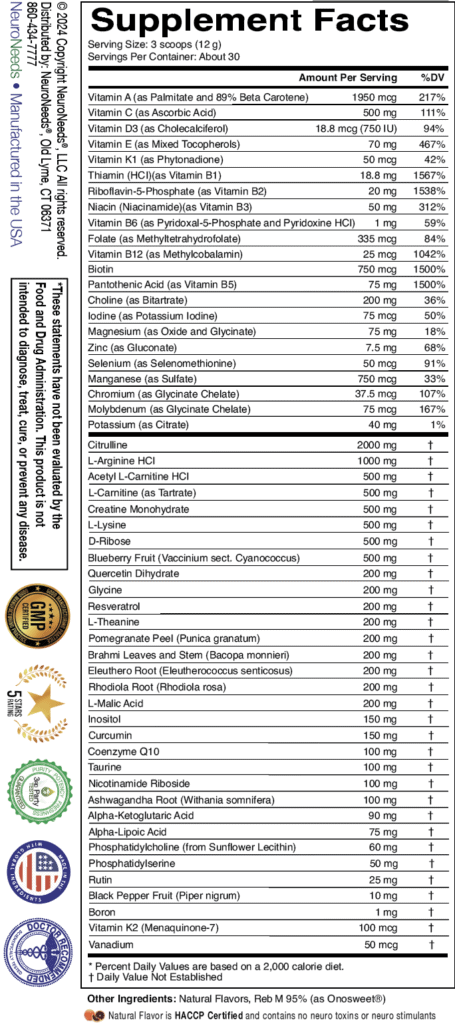$84
Ashwagandha
Ashwagandha has been used since ancient times in Ayurvedic (India) traditional herbal medicine for many purposes, but especially to relieve stress and anxiety. Ashwagandha has effects on multiple mediators of the stress response. Placebo-controlled studies have revealed reduced perceived stress, decreased anxiety, improved sleep quality, and a reduction in cortisol (stress hormone). Other medical uses per studies include for various mental health conditions, including depression, and a reduction of blood sugar, blood lipids, and markers of oxidative stress. Men often take Ashwagandha due to studies that have shown increased exercise performance, improved strength, and higher testosterone levels (the latter of which is not seen in women). Ashwagandha is generally well tolerated. However, side effects such as diarrhea, nausea, headache, or sedation can occur at higher dosing. The recommended dose among different brands varies widely, and ActivNeeds is on the lower end (100 mg). However, there may be interactions with medications to manage blood sugar, blood pressure, or thyroid disease. There may also be effects on the liver. It is recommended that ashwagandha not be taken during pregnancy or breastfeeding. Consult with your physician if in doubt. As dosages in studies are generally 250 or 300 mg per day, you may want to consider adding additional ashwagandha to your supplement regiment.
Ashwagandha in ActivNeeds
Ashwagandha (Withania somnifera) is added due to its use for millennia in Ayurvedic (India) traditional medicine to help relieve stress and anxiety, improve sleep quality, and its effects in mental health and exercise performance.
Ashwagandha (Withania somnifera) is an evergreen shrub that is native to India, the Middle East, and North Africa. Its root has been used since ancient times in Ayurvedic (India) traditional herbal medicine for many purposes.
Ashwagandha is one of the most important herbs in Ayurvedic practice, the traditional medicine of India. Ashwagandha is often used to help relieve stress and anxiety. Ashwagandha has effects on multiple mediators of stress such as cortisol and other components of the hypothalamic-pituitary-adrenal axis, the main system that regulates the stress response. It also has an effect on heat shock proteins (including Hsp70), which is a system that protects proteins against high oxidative environments.
A significantly reduced perceived stress, improved sleep quality, and a reduction in cortisol, compared to placebo, were found in one study [https://www.ncbi.nlm.nih.gov/pmc/articles/PMC6979308]. Ashwagandha is often used for sleep, in fact, the scientific species name means “sleep inducing”. Another placebo-controlled study revealed a significant reduction in anxiety [https://www.ncbi.nlm.nih.gov/pmc/articles/PMC6750292]. Additional neuropsychiatric uses of this herb include for in the treatment of mental health conditions, including depression, bipolar, and schizophrenia.
A review of 24 studies found that ashwagandha significantly reduced blood sugar, hemoglobin A1c, insulin, blood lipids, and markers of oxidative stress [https://pubmed.ncbi.nlm.nih.gov/31975514].
Another potential benefits of ashwagandha include better athletic performance. A meta-analysis of five studies “showed a significant enhancement in VO2max (maximum oxygen consumption) in healthy adults and athletes.” [https://www.ncbi.nlm.nih.gov/pmc/articles/PMC7230697]. In another study, ashwagandha improved muscle strength and testosterone levels compared to placebo in healthy young men. [https://www.ncbi.nlm.nih.gov/pmc/articles/PMC4658772]. Other studies have shown that the increased testosterone level only occurs in men, not in women. By boosting testosterone levels, ashwagandha increases sperm count, and may improve male fertility.
Ashwagandha is generally well tolerated. However, side effects such as diarrhea, nausea, headache, or sedation can occur at higher dosing. Of note, ashwagandha recommended dosages range greatly, including from 125 to 3,000 mg in some standard commercial brands. For this reason, the dosing in ActivNeeds is on the lower end, 100 mg. Side effects are unlikely at the low dose present in ActivNeeds. Nonetheless, consult with your physician if you have a significant health problem or are on medications. Even though the dosage in ActivNeeds is low, there may be interactions with medications to manage blood sugar, blood pressure, or thyroid disease. There may also be effects on the liver. It is recommended that ashwagandha not be taken during pregnancy or breastfeeding.
The dose of ashwagandha often recommended ranges from 250-600 mg per day. In the above-referenced studies, dosages were generally 250 or 300 mg. The dose of ashwagandha in ActivNeeds is much lower (100 mg) in order to avoid side effects in sensitive people. Thus, you may want to consider adding additional ashwagandha to your supplement regiment.
How and Why Ashwagandha Is Used in ActivNeeds
Ashwagandha is added to ActivNeeds due to its use for millennia in Ayurvedic (India) traditional medicine to help relieve stress and anxiety, improve sleep quality, and its effects in mental health and exercise performance. Side effects are unexpected at the low dose used in ActivNeeds. However, consult with your physician if you have a significant health problem or are on medications. Do not take if pregnant or breast-feeding.
Order ActivNeeds Today
Formulations










